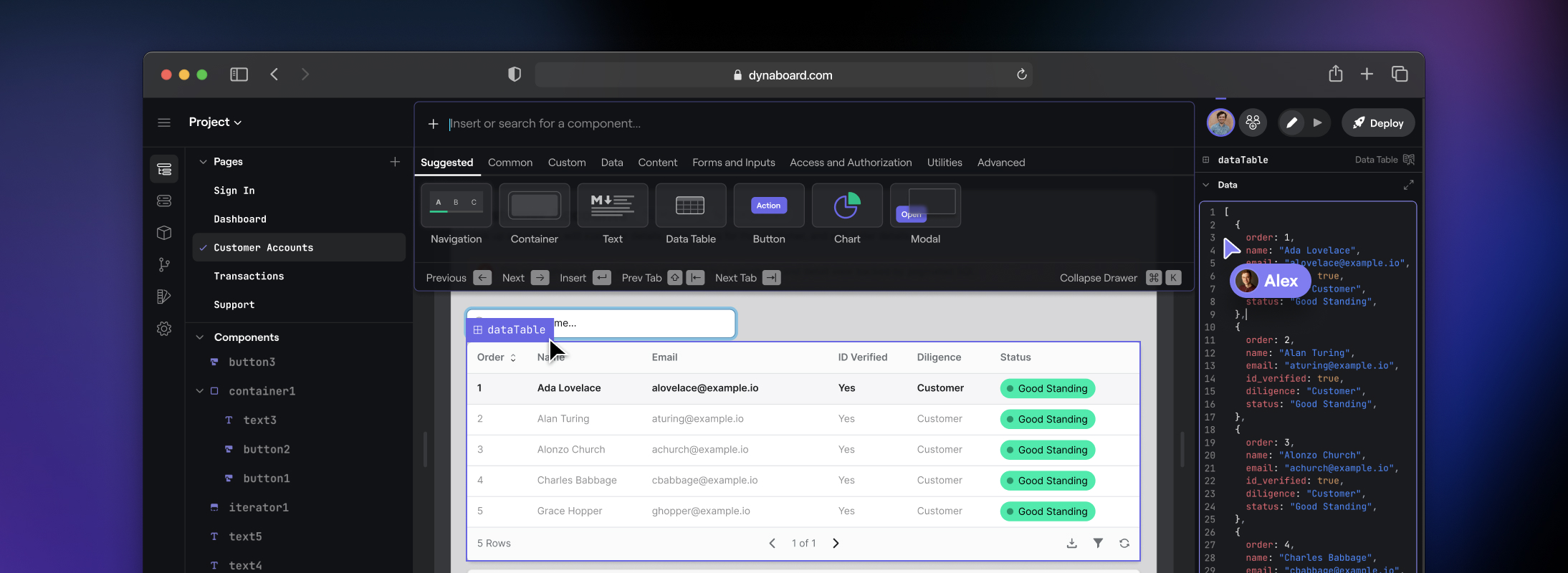The first creative tool for development teams

Alex Kern has been building web applications for years, whether at hackathons (he founded Cal Hacks) or while working on his previous company, Distributed Systems, which was acquired by Coinbase. Because of those experiences, he believed that the process of building production-ready apps in a startup or hackathon-like environment would be easier and faster if geared toward developers and technically-minded folks. Enter: Dynaboard.
Why we partnered
Dynaboard is a low-code web application development platform that brings together developers, product managers, designers, and technical operators in a single product, while also giving developers the tools they need to build more advanced features without traditional deployment hurdles.
Before Alex started working on Dynaboard (officially), Momento cofounder Khawaja Shams put us in touch with him. We were immediate believers in Alex, the product, and the direction of the company. But we also knew that building such a sophisticated product the traditional way would take a long time because of the major functional and performance hurdles of browser-based rendering, support for sandboxed user code on both client and server using WebAssembly, and the monitoring and observability requirements needed by production apps.
“The big pitch from TheGP was accelerating the time to market for us,” Alex said. “It was originally going to take us maybe a year to actually get the product in people’s hands, but because of this partnership, we were able to shave about six months off that timeline and reach a MVP milestone that was really important to us. It allowed me to not have to only think about capital at the very beginning, and I could leverage a team of already activated superstar engineers, product folks, and designers.”
Throughout our partnership with Dynaboard, we had Stas Baranov and Chris Jones (now the CTO at Switchboard) plug into Dynaboard’s team on the engineering side. On the talent side, John Dip and Josh Hernández have helped source full-time members of Dynaboard’s growing engineering team.
What we built together
Alex told us that having someone like Stas in his corner (and joining standups) was imperative to building out Dynaboard’s initial product.
“I’m a technical founder, but Stas had a lot of very relevant experience, so our onboarding process with him was very fast and I didn’t have to spend six months searching for the right principal-level engineer who could be my sounding board,” he said. “Also, Stas actually wrote code for us—he got his hands dirty and was involved in the process of crafting the product.”
Earlier in his career, Stas cofounded Google App Maker, which was also a low-code application development tool that holds certain parallels to Dynaboard, like its collaborative multiplayer functionality. “Stas basically validated a lot of the architectural decisions that I had vague ideas about, and he was a major influence in how we actually ended up building the architecture,” Alex said.
For Stas, the experience working with Dynaboard (he was plugged into the team for about eight months) was rewarding because he was able to apply his deep systems knowledge and build out the product’s core infrastructure—including security access controls, billing, metrics tracking, analytics, and some blockchain features.
“I mainly spent my time actually designing and coding specific, larger features, that required fast and disciplined engineering at the same time,” Stas said. “It wasn’t the flying by the seat of your pants that you see at a lot of startups—it was an extremely well-run and smooth engineering process because Alex is so good, and all of the engineers working on the product were fairly seasoned.”
For Alex, working with Stas and a team of senior product folks sourced by TheGP took the technical heavy lifting off his hands so he could focus on product, customers and hiring. In June, the company announced a $6 million seed round, which we participated in along with XYZ Venture Capital, Floodgate Fund, General Catalyst, The House Fund, Abstract, Mantis, and a number of angels. Dynaboard also launched its open beta last fall, six months ahead of schedule.